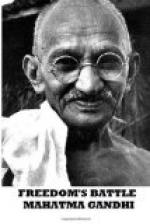That is the Khilafat in a nut-shell; but you have also got the Punjab. The Punjab has wounded the heart of India as no other question has for the past century. I do not exclude from my calculation the Mutiny of 1857. Whatever hardships India had to suffer during the Mutiny, the insult that was attempted to be offered to her during the passage of the Rowlatt legislation and that which was offered after its passage were unparalleled in Indian history. It is because you want justice from the British nation in connection with the Punjab atrocities: you have to devise, ways and means as to how you can get this justice. The House of Commons, the House of Lords, Mr. Montagu, the Viceroy of India, everyone of them know what the feeling of India is on this Khilafat question and on that of the Punjab; the debates in both the Houses of Parliament, the action of Mr. Montagu and that of the Viceroy have demonstrated to you completely that they are not willing to give the justice which is India’s due and which she demands. I suggest that our leaders have got to find a way out of this great difficulty and unless we have made ourselves even with the British rulers in India and unless we have gained a measure of self-respect at the hands of the British rulers in India, no connection, and no friendly intercourse is possible between them and ourselves. I, therefore, venture to suggest this beautiful and unanswerable method of non-co-operation.
IS IT UNCONSTITUTIONAL?
I have been told that non-co-operation is unconstitutional. I venture to deny that it is unconstitutional. On the contrary, I hold that non-co-operation is a just and religious doctrine; it is the inherent right of every human being and it is perfectly constitutional. A great lover of the British Empire has said that under the British constitution even a successful rebellion is perfectly constitutional and he quotes historical instances, which I cannot deny, in support of his claim. I do not claim any constitutionality for a rebellion successful or otherwise, so long as that rebellion means in the ordinary sense of the term, what it does mean namely wresting justice by violent means. On the contrary, I have said it repeatedly to my countrymen that violence whatever end it may serve in Europe, will never serve us in India. My brother and friend Shaukat Ali believes in methods of violence; and if it was in his power to draw the sword against the British Empire, I know that he has got the courage of a man and he has got also the wisdom to see that he should offer that battle to the British Empire. But because he recognises as a true soldier that means of violence are not open to India, he sides with me accepting my humble assistance and pledges his word that so long as I am with him and so long as he believes in the doctrine, so long will he not harbour even the idea of violence against any single Englishman or any single man on earth. I am here to tell you that he has been as true as his word and has kept




